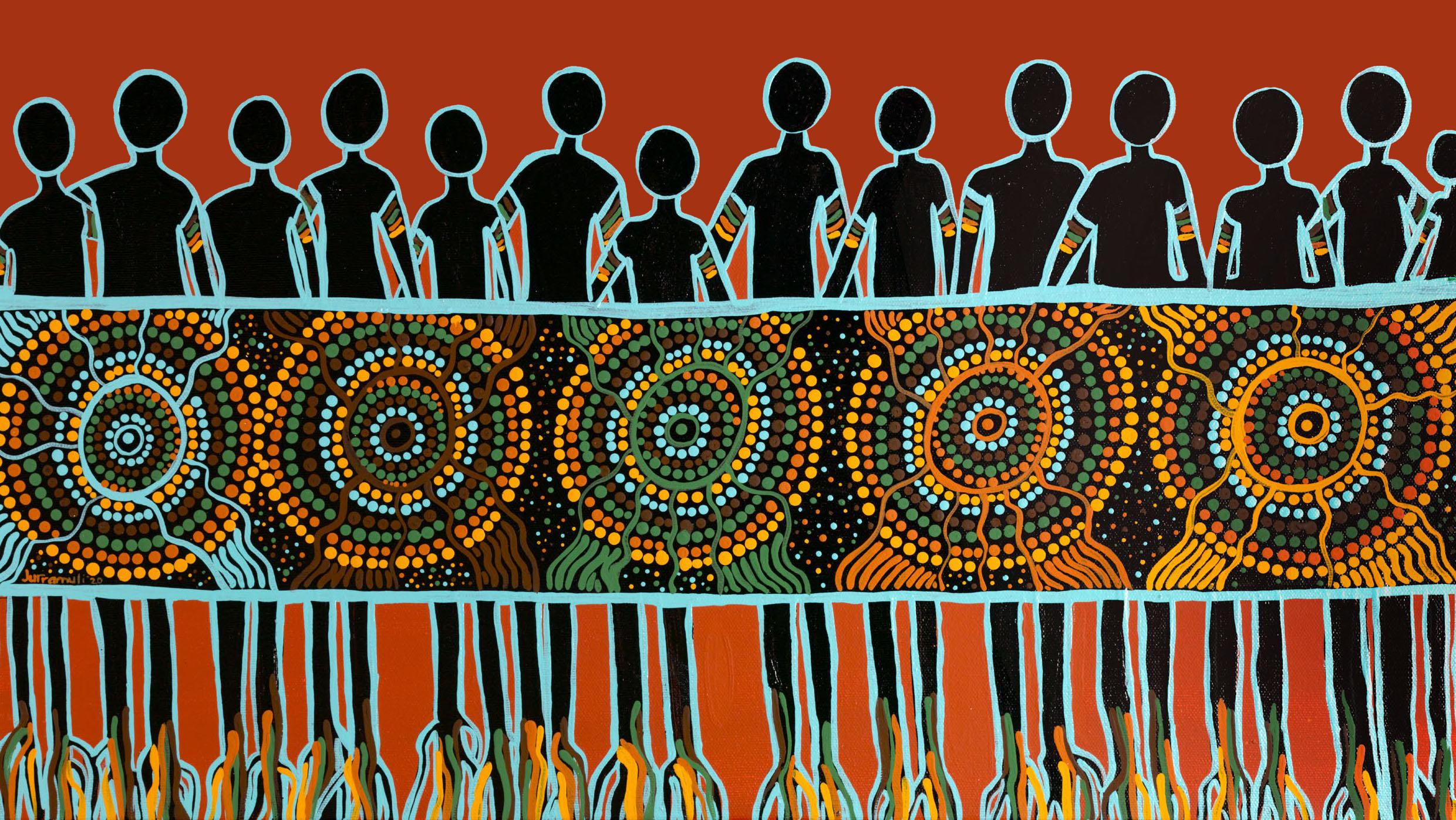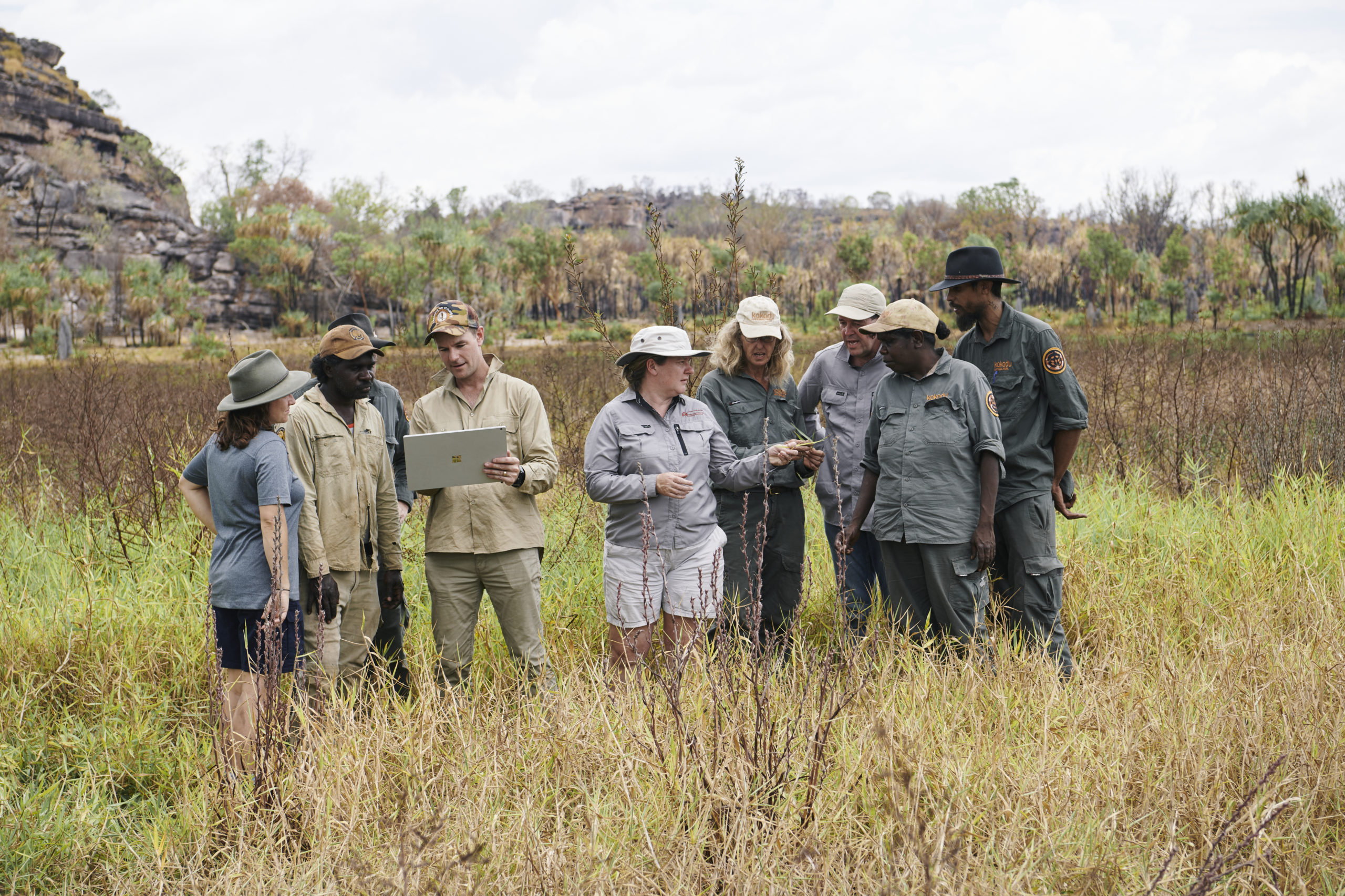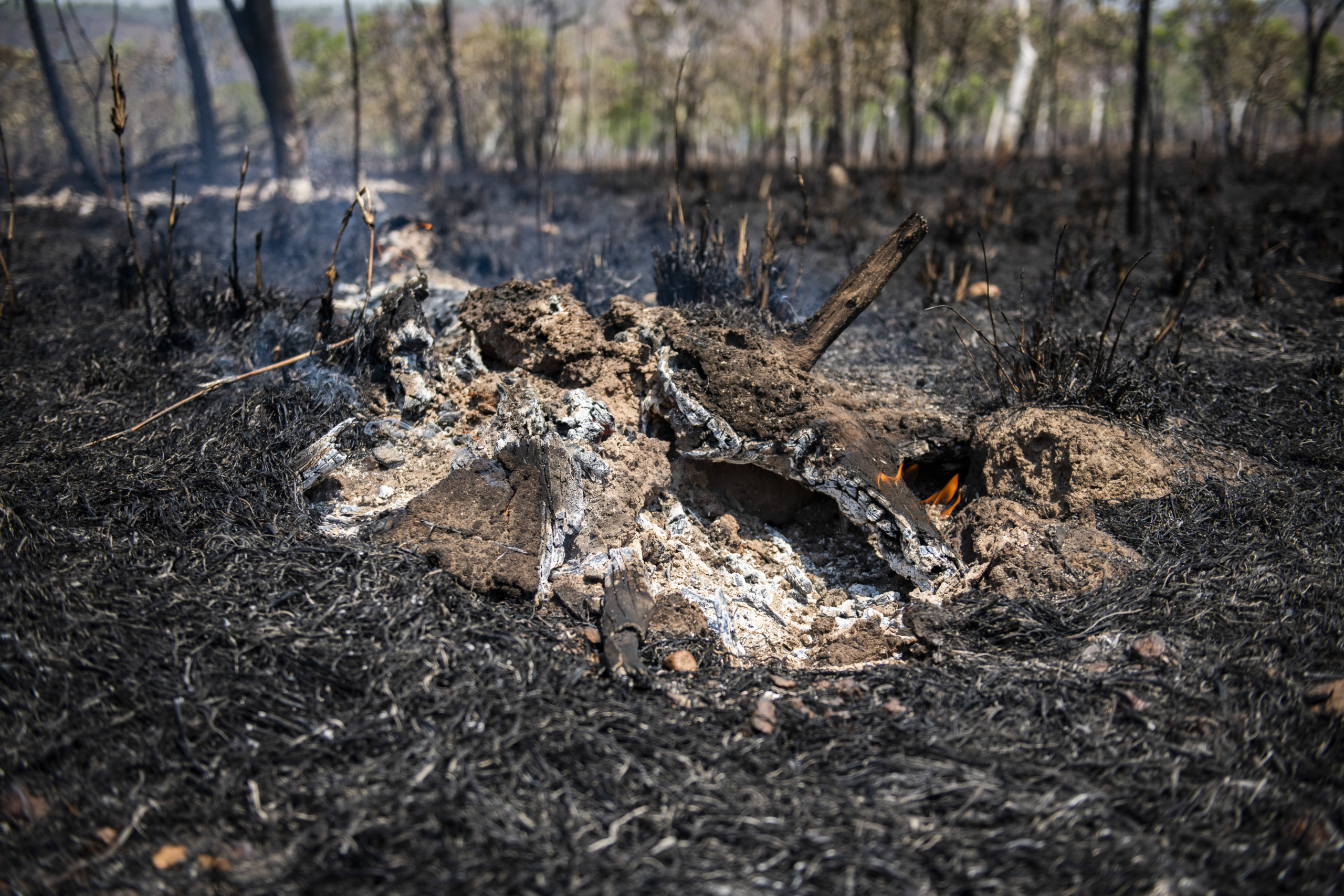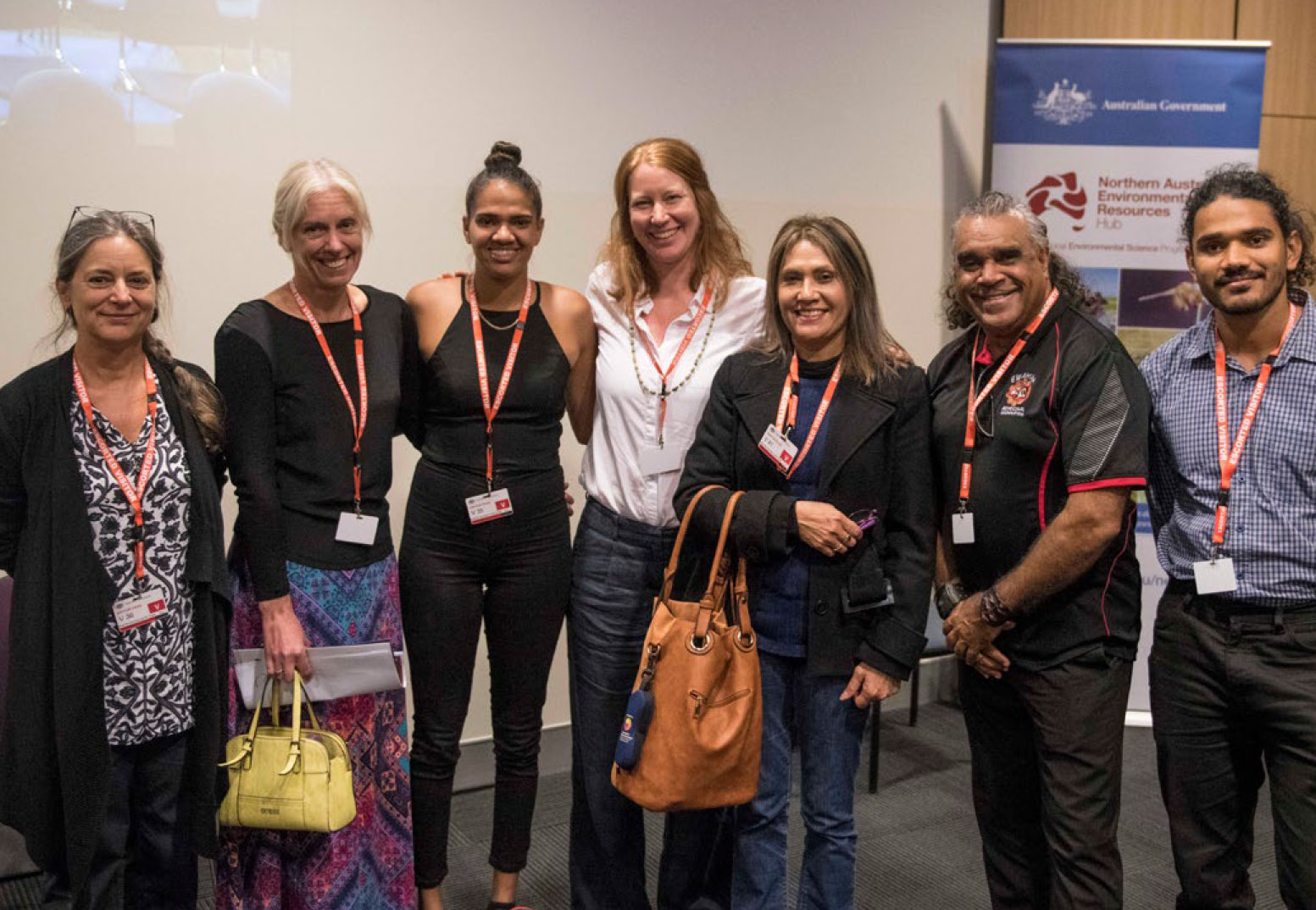In Australia, Indigenous peoples’ rights and responsibilities for their traditional territories have been recognised across almost half the lands and waters, and traditional custodial responsibility extends across most of the remainder. Indigenous land and sea managers draw on their knowledge, developed over tens of thousands of years, to make decisions about caring for Country. Working effectively and ethically with Indigenous peoples is central to addressing the nation’s environmental challenges.
The Northern Australia Environmental Resources Hub is supporting Indigenous natural resource management and the development of sustainable business opportunities that benefit Indigenous people and are economically profitable. Indigenous-led guidelines are giving Indigenous peoples a voice about what is best practice in working with their knowledge in collaborative partnerships, and these guidelines are being taken up across Australia.
An Indigenous-led project in Kakadu National Park is mixing responsible artificial intelligence, modern science and traditional knowledge to solve complex environmental management problems. Improving the methods used to calculate carbon credits for savanna burning projects can further incentivise emissions reductions and carbon storage, supporting many Indigenous-owned carbon businesses. And research has demonstrated that – in addition to their environmental benefits – Indigenous land and sea management programs are a pathway to Indigenous economic independence and regional development, as well as providing significant wellbeing outcomes.
Impact snapshots
Strengthening and sharing knowledge for land and sea management
More than 100 Indigenous contributors have created Australia’s first guidelines on how to best strengthen and share Indigenous knowledge in land and sea management. Our Knowledge Our Way in caring for Country Best Practice Guidelines feature 23 Indigenous-led, best-practice case studies identifying ways partners can support good knowledge practice through strong partnership agreements, support for cultural governance arrangements, and protocols. A key takeaway for organisations interested in building partnerships with traditional custodians for land and sea management is to develop genuine partnerships that are founded on respect for Indigenous knowledge, culture and Country.
Discover more project findings or read the guidelines here.
‘Sharing the knowledge for caring for our Land’ © Emma Burchill
Keeping Country healthy in Kakadu National Park
Invasive para grass threatens important cultural and ecological values of Nardab floodplains in Kakadu National Park. Hub researchers have built on long-term collaborations with Bininj/Mungguy Traditional Owners in the park to develop and apply Bininj indicators of cultural–ecosystem health for the floodplains. These indicators are being used to identify priority areas for targeted para grass control and monitor the effectiveness of treatments. Supported by innovative AI drone technology, rangers can easily survey the floodplains and Bininj have been excited to see the rapid recovery of floodplain habitat and the return of traditional foods such as turtles, magpie geese and other waterfowl.
Discover more project findings or read the final report.
Kakadu Rangers have previously had to collect and compile all data manually. Photo: Microsoft.
Supporting savanna fire management through carbon farming
Scientists and Traditional Owners have worked together for more than a decade to understand how to best calculate changes in greenhouse gas emissions and carbon storage in savanna landscapes due to changes in fire management. This research has, and continues to, improve these methods used to calculate carbon credits for savanna burning projects, leading to reduced greenhouse gas emissions and increased carbon storage. The credits in turn provide important income for remote Indigenous communities and more incentives for fire management across the north.
Discover more project findings or read the final report.
Coarse woody debris burning after the fire front has passed. Photo: NESP Northern Hub.
Caring for Country and improving Indigenous lives
Indigenous land and sea management programs – which include Indigenous ranger, Caring for Country and Indigenous Protected Area programs – have well-documented environmental and ecological benefits. This research demonstrated that these programs also deliver significant socio-economic and wellbeing outcomes to Indigenous people and communities beyond those employed by the programs. Moreover, just being involved in this research has had many positive impacts for communities in WA’s Fitzroy River valley and north Queensland, including positive impacts for land management.
Discover more project findings or read the final report.
Natalie Stoeckl, Diane Jarvis, Celia Boxer, Jane Addison, Sharon Prior, David Hudson and Emile Boxer – researchers, co-researchers and collaborators – at the Department of Climate Change, Energy, the Environment and Water in Canberra during 2018 Reconciliation Week. Photo: NESP Northern Hub.
Research outputs & attributions
Research outputs
Scientific papers
Our Knowledge Our Way Guidelines
Reports
Factsheets
- Our Knowledge Our Way in caring for Country (practice brief for scientists, Jul 2021)
- Our Knowledge Our Way in caring for Country (policy brief, Jul 2021)
- Healthy people in a healthy environment: Key directions statement (IUCN Australia statement, May 2020)
- Bininj/Mungguy healthy country indicators (start-up factsheet, Apr 2019)
- Multiple benefits of Indigenous land & sea management programs (wrap-up factsheet, Feb 2019)
- Supporting savanna fire management through carbon farming (wrap-up factsheet, Feb 2019)
- Our Knowledge Our Way Guidelines (call for case studies, Sep 2018)
- Multiple benefits of Indigenous land and sea management programs (project update Jun 2018)
- Knowledge brokering for Indigenous land management (Fitzroy case study update, Jun 2018)
- Weaving knowledge systems for sustainable environments and societies: Five tasks (science summary, May 2018)
- Improving our understanding of the multiple benefits of Indigenous land & sea management programs (May 2018)
- Multiple benefits of Indigenous land and sea management programs (project update Dec 2017)
- Multiple benefits of Indigenous land and sea management programs (start-up factsheet Jun 2017)
- Knowledge brokering for Indigenous land management (start-up factsheet, Oct 2016)
- Savanna fire sequestration method (start-up factsheet, Sep 2016)
Videos and presentations
Policy notes
Impact stories
News releases
Media (selection)
- How to use drones responsibly in Kakadu (Cosmos, Dec 2021)
- Protocols for drones in Kakadu (The Mandarin, Nov 2021)
- Indigenous led guidelines share ag knowledge (The Australian Farmer, Jul 2020)
- Best practice guidelines on Indigenous knowledge sharing (Tasmania Times, Jul 2020)
- Our Knowledge, Our Way: Indigenous-led best practice guidelines (ABC Kimberley, Jul 2020)
- Indigenous input for best practice (Green Career, Jul 2020)
- Microsoft teams up with Kakadu’s owners (Canberra Times)
- Microsoft teams up with Kakadu’s owners (News.com.au)
- Drones and AI making a dent in Kakadu’s war against weeds (ZD Net)
- Microsoft teamed up with Indigenous Traditional Owners in Kakadu, using AI and drones to rehabilitate parts of the national park (Business Insider)
- Microsoft teams up with Kakadu’s owners (Bendigo Advertiser)
- AI meets Indigenous intelligence in Kakadu (Government News)
- Microsoft, CSIRO partner with Kakadu National Park on environmental project (IT Wire)
- AI and Traditional Knowledge combine to rehabilitate Kakadu National Park (National Indigenous Times)
- CSIRO, Microsoft project combined AI with Indigenous knowledge to protect national parks (Computer World)
Blog
Project webpages
Attributions
- Project leaders: Ro Hill (CSIRO), Ricky Archer (NAILSMA), Cathy Robinson (CSIRO), Natalie Stoeckl (University of Tasmania), Garry Cook (CSIRO)
- OKOW editors: Emma Woodward, Pia Harkness (CSIRO)
- OKOW lead Indigenous authors: Anne Poelina (Martuwarra Council); Torres Webb (CSIRO); Barry Hunter (Djarnda Enterprises); Graham Atkinson (Dhelkunya Dja Land Management Board); Bradley Moggridge (University of Canberra); Linda Payi Ford (Charles Darwin University)
- Michael Douglas (NESP NAER Hub Leader)
- Peter Cochrane, OKOW partner and Chair of the Australian Committee for IUCN (International Union for Conservation of Nature)
- Nat Raisbeck-Brown and Pethie Lyons (CSIRO)
- Karen Dayman (Kimberley Land Council/NESP Northern Hub)
- Authors of the Our Knowledge Our Way Guidelines: Aboriginal Carbon Foundation, Aiken, M., Arbon, V., Atkinson, G., Bardi Jawi Niimidiman Aboriginal Corporation, Bieundurry, J., Birriliburu Rangers, Bourke, M., Bracknell, C., Brooking, G., Brooking, S., Brumby, W., Buissereth, W., Bulmer, V., Burarrwaŋa, D. Y., Bush Medijina®, Cameron, A. P., Cherel, V., Cherry, K., Chungalla, D., Clifton, A., Collard, T., Collard, Y., Cook, C., Cox, C., Cranbell, T., Daley, L., Dadd, U. L., Dann, R., Dann, R., Darug Ngurra, Dawson, M., Dhimurru Aboriginal Corporation, Foley, R., Ford, L., Forrest, J., Glass, P., Gore-Birch, C., Graham, M., Hand, M., Harkness, P., Hill, J., Hill, R., Hobbs, A., Hobbs, D., Hodge, P., Hunter, B., James, B., James, R., Jingle, E., Juboy, C., Juboy, P., Kimberley Land Council, Knight, O., Kogolo, A., Lemire, J., Lenard, B., Lenard, N., Lennard, C., Lennard, D., Lennard, V., Lincoln, G., Lyons, I., Malay, I., Malay, J., Malay, L., Malay, N., Malay, Z., Malmer, P., Marshall, D., Marshall, H., Masigalgal Rangers, Masigalgal RNTBC, McCall, E., McGrath, V., McLean, M., McMurray, L., McTaggart, P. M., Midmee, W., Millindee, L., Moggridge, B., Morton, S., Mowaljarlai, D., Mulladad, M., Myers, A., NAILSMA, Narwal, H., Nnarda, T., Norman-Dadd, A. C., Nuggett, J., Nulgit, C., Nulgit, L., Nulgit, P., Nyangumarta Warrarn Aboriginal Corporation RNTBC, O’Conner, M. H., Perkins, R., Phoka, C., Poelina, A., Poudrill, D., Prober, S. M., Raisbeck-Brown, N., Riley, P., Ross, J., Schultz, L., Scott, R., Shadforth, I., Shandley, J., Shaw, K., Skeen, S., Smith, G., Smith, A .S. , Smith, N., Street, N., Suchet-Pearson, S., Sunfly, A., Tengö, M., Thomas, P., Trakansuphakon, N., Trakansuphakon, P., Turner, A., Turpin, G., Turpin, M., Waanyi Garawa, Webb, T., Williams, B., Wiluna Martu Rangers, Wong, N., Wongawol, B., Woodward, E., Wright, S., Wungundin, H., Yamatji Marlpa Aboriginal Corporation, Yates, P., Yiyili Aboriginal Community School Board, Yuen, E., Yungabun, H.
- Reviewers of the Our Knowledge Our Way Guidelines: Cowell, S., Davis, M., Fisher, J., Godden, L., Mackay, R., Mahoney, R., Major, D., Nursey-Bray, N., Taylor, P., Warren, L.
- Samantha Setterfield (University of Western Australia), Justin Perry (CSIRO), and Jennifer Macdonald (CDU-CSIRO)
- Dennis Cooper (Northern Hub/Northern Land Council)
- Alfred Nayinggul, Kenneth Mangiru, Na-gangila Bangalang, Anita Nayinggul, Ursula Nadjamerrek, Grant Manbiyarra Nayinggul, Jacob Nayinggul, Michael Nayinggul, Cody Namundj, Timothy Djumburri, Laine Nayinggul, Hilton Garnarradj, Sebastian Nagrrugrruba, Grant Nayinggul, Serena McCartney, Sean Nadji, Bill Nadji, Johnno Nadji, Samantha Dempsey, Nola Dempsey, Shianne Dempsey
- TRaCK and NERP research programs and researchers
- Anna Richards (CSIRO), Adam Liedloff (CSIRO), Shaun Levick (Charles Darwin University and CSIRO), Mick Meyer (CSIRO)
- Diane Jarvis (James Cook University [JCU]/CSIRO), Silva Larson (JCU), Daniel Grainger (JCU), Jane Addison (JCU/CSIRO) & Michelle Esparon (JCU)
- Bidan Aboriginal Corporation, Bunuba Dawangarri Aboriginal Corporation RNTBC
- Ewamian Aboriginal Corporation, Gooniyandi Aboriginal Corporation RNTBC, Ro Hill (CSIRO), Petina Pert (CSIRO), Anne Poelina (Nyikina-Warwa, Madjulla Inc.), Joe Ross (Bunuba Dawangarri Aboriginal Corporation), Walalakoo Aboriginal Corporation, Felecia Watkin-Lui (JCU), Mark Thomas (JCU), Yanunijarra Ngurrara Aboriginal Corporation RNTBC, Sharon Prior (Ewamian Aboriginal Corporation), David Hudson (Ewamian Aboriginal Corporation), Emile Boxer, Celia Boxer, Hansen Boxer (Walmajarri TOs), Laurel Sutcliffe (Broome), Tanya Casey, Megan Mosquito, Jenny Lacey, Lyn Baily, Brian Bing, Ken Georgetown and Barry Fisher (Ewamian), Peter Murray, Annette Kogolo (Walmajarri), Andrea Myers, Mary Aiken (Bunuba), Helen Malo, John Quilty (Gooniyandi), Tania Smith (CEO, GAC), Ian Perdrisat, Damien Parriman (Nyikina-Mangala), Christine Boddington (Derby), Scott Channing, Erika Schwartz, Tharman Saverimuttu, Deborah Hawke (PM&C), Anthea Brecknell, Laura Perrott (DoEE), Karen Dayman, Clare Taylor, Jane Thomas (NESP Northern Hub)
Hub researchers involved in this project



